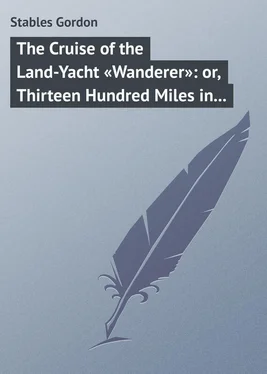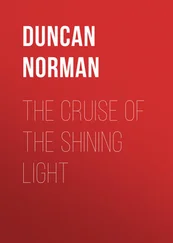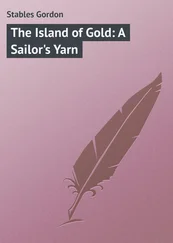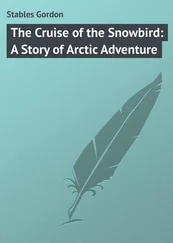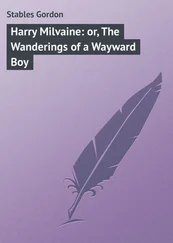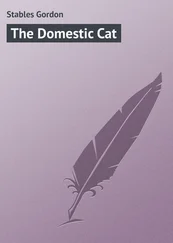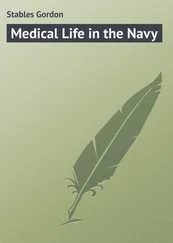Gordon Stables - The Cruise of the Land-Yacht «Wanderer» - or, Thirteen Hundred Miles in my Caravan
Здесь есть возможность читать онлайн «Gordon Stables - The Cruise of the Land-Yacht «Wanderer» - or, Thirteen Hundred Miles in my Caravan» — ознакомительный отрывок электронной книги совершенно бесплатно, а после прочтения отрывка купить полную версию. В некоторых случаях можно слушать аудио, скачать через торрент в формате fb2 и присутствует краткое содержание. Жанр: foreign_prose, Путешествия и география, на английском языке. Описание произведения, (предисловие) а так же отзывы посетителей доступны на портале библиотеки ЛибКат.
- Название:The Cruise of the Land-Yacht «Wanderer»: or, Thirteen Hundred Miles in my Caravan
- Автор:
- Жанр:
- Год:неизвестен
- ISBN:нет данных
- Рейтинг книги:5 / 5. Голосов: 1
-
Избранное:Добавить в избранное
- Отзывы:
-
Ваша оценка:
- 100
- 1
- 2
- 3
- 4
- 5
The Cruise of the Land-Yacht «Wanderer»: or, Thirteen Hundred Miles in my Caravan: краткое содержание, описание и аннотация
Предлагаем к чтению аннотацию, описание, краткое содержание или предисловие (зависит от того, что написал сам автор книги «The Cruise of the Land-Yacht «Wanderer»: or, Thirteen Hundred Miles in my Caravan»). Если вы не нашли необходимую информацию о книге — напишите в комментариях, мы постараемся отыскать её.
The Cruise of the Land-Yacht «Wanderer»: or, Thirteen Hundred Miles in my Caravan — читать онлайн ознакомительный отрывок
Ниже представлен текст книги, разбитый по страницам. Система сохранения места последней прочитанной страницы, позволяет с удобством читать онлайн бесплатно книгу «The Cruise of the Land-Yacht «Wanderer»: or, Thirteen Hundred Miles in my Caravan», без необходимости каждый раз заново искать на чём Вы остановились. Поставьте закладку, и сможете в любой момент перейти на страницу, на которой закончили чтение.
Интервал:
Закладка:
A pheasant is calling to its mate among the ferns; it is time apparently for pheasants to retire. Time for weasels too, for across the road runs a mother-weasel with a string of young ones all in a row. The procession had been feeding in that sweetly-scented beanfield, and is now bound for bed, and I myself take the hint and go slowly back to the Wanderer. But Hurricane Bob has found a mole, and brings that along. It is not dead, so I let it go. How glad it must feel!
At nine o’clock the sun had set, but left in the north-west a harbinger of a fine morning. What delicious tints! What delicate suffusion of yellows, greens, and blues! Just as the sun was sinking red towards the horizon uprose the moon in the east, round and full, and in appearance precisely like the setting sun. The trees on the horizon were mere black shapes, the birds had ceased to sing, and bats were flitting about. At eleven o’clock, it was a bright clear night with wavy dancing phosphorescent-like gleams of light in the north – the Aurora!
June 11th . – Started at eight o’clock en route by cross roads for Ashby-de-la-Zouch. Shortly afterwards passed a needle-shaped monument to George Fox, founder of the Society of Friends. It is a very humble one, and stands in a wooded corner almost surrounded by hawthorn. Went through the village of Fenny Drayton. Why called “Fenny,” I wonder? It is a little hamlet, very old, and with a pretty and very old church, but I had no time to get up to the steeple.
Road narrow but good. A glorious morning, with a blue sky and delicious breeze.
Greensward at each side of the road, with ragged hedges and stunted oaks and ashes; roses in the hedgerows, golden celandine on the sward, and tall crimson silenes everywhere. By-and-bye the country opens, and we come upon a splendid view; and here is a sight – a hedgerow of roses nearly a mile long! Here are as many of these wildly beautiful flowers as would drape Saint Paul’s Cathedral, dome and all.
We pass Sibson, with its very quaint old inn and little ivy-covered church surmounted by a stone cross; and Twycross, a most healthy and pretty rural village. There we unlimbered to dine, and in the afternoon went on towards our destination. Past Gopsal Park, with its quaint old lodge-gates and grand trees, on through dark waving woods of beech, of oak, and ash, on through lanes with hedgerows at each side, so tall that they almost meet at the top. We cross the railway now to avoid a steep bridge. Meesham is far away on the hill before us, and looks very romantic and pretty from the bridge. Its ancient church rears its steeple skyward, high over the houses that cluster round it, giving the place the appearance of a cathedral city in miniature. The romance vanishes, though, as soon as we enter the town. One long, steep street leads through it, its houses are of brick and most uninteresting, and the public-houses are so plentifully scattered about that thirst must be a common complaint here.
Ashby-de-la-Zouch lies above us and before as at last, and strangely picturesque it looks. Bows of queer-shaped trees are on each side of us; up yonder, in front, is a graveyard on a braeland; farther to the right a tall church spire, and flanking all, and peeping through the greenery of trees, is the ruined castle.
Market-day in Ashby, and we are mobbed whenever we stop to do some shopping.
The church here is well worthy of a visit; so too is the castle, but tourists ought to refresh their minds before spending a few days here by once more reading “Ivanhoe.”
It was hard, uphill work from Ashby; drag, drag, drag; horses tired, Pea-blossom limping, and all weary.
At the hilltop we came into quite a Highland country, and thence we could catch glimpses of lovely scenery and far-off blue hills.
The effects of the sunlight on the green oak woods and the yellow ashes were very charming.
Lount at last; a humble inn, quiet, kindly people, and a little meadow.
Chapter Nine.
A Quiet Sunday at Lount – A Visit to a Pottery – Beeston Hall – A Broiling Day
“How still the morning of this hallowed day!
Hushed is the voice of rural labour,
The ploughboy’s whistle and the milkmaid’s song.”
June 28th.
The country is indeed a Highlands in miniature. I might describe the scenery in this way: Take a sheet of paper and thereon draw irregular lines, across and across, up and down, in any conceivable direction. These lines, then, shall represent blackthorn hedges bounding fields of flowering grass and hay. Place trees in your picture anywhere, and, here and there, a wood of dwarfed oak, and dot the field-nooks with picturesque-looking cattle-huts. In the centre let there be a cluster of irregularly-built brick-tiled houses and the domes of a pottery works. This, then, is Lount and its surroundings, where we are now bivouacked. But to complete the sketch there must be footpaths meandering through the meadows, with gaps in the hedges for rustic stiles. Nor must the cattle be forgotten.
And all the country visible from this point is broken up into round hills, and each field is a collection of smaller hills, shaped like waves of a storm-tossed ocean.
How still and quiet it is! And above the green of fields and woods is a blue, blue sunny sky. Larks are singing up yonder, their songs mingling sweetly with the chiming of the church bells that comes floating over the hills, rising and falling as the breeze does, now high and clear, now soft and far-away like.
I had the caravan half-filled this morning with bright-eyed, wondering children. A parent brought me a red cotton handkerchief.
“T’missus,” he explained, “was makin’ oop a pie, and I thought upon thee loike.”
It was kindly, and I couldn’t refuse the gift, though gooseberry pies form no part of the Wanderer’s menu .
Ten o’clock pm. – The full moon has just risen over the dark oak woods; a strangely white dense fog has filled all the hollows – a fog you can almost stretch out your hands and touch. The knolls in the fields all appear over it, looking like little islands in the midst of an inland sea.
The corncrake is sounding his rattle in the hayfields – a veritable voice of the night is he – and not another sound is to be heard.
Passed a garden a few minutes ago while walking out. Such a sight! Glowworms in thousands; far more lovely than fireflies in an Indian jungle.
To bed.
June 29th . – We got under way by 8:30, after a brief visit to the Coleorton Pottery. This place has an ugly enough appearance outside, but is very interesting internally. The proprietor kindly showed my coachman and me over the works. We saw the great heaps of blue clay that had been dug from the hillside and left exposed for weeks to the weather, the tanks in which it is mixed with water, the machinery for washing and sifting it, the clay being finally boiled to the consistency of putty. An old man took dabs of this putty and cast them on a revolving table, smiling as he did so as he watched our wondering looks, for lo! cups and saucers and teapots seemed to grow up under his fingers, and a whole tea-set was produced more quickly than one could have brewed a cup of tea.
A somewhat misty morning, but roads good though hilly, and scenery romantic. But at Castle Donington, a long brick town, the scene changes. Away go hill and dale, away goes all romance, and we pass through a flat country, with nothing in it to enlist sympathy save the trees and rose-clad hedges.
But soon again comes another change, and we cross the broad and silvery Trent, stopping, however, on the bridge to admire the view.
We arrive at Long Eaton, and encamp by the roadside to cook dinner. Rows of ugly brick houses, a lazy canal with banks black with coal dust; the people here look as inactive as does their canal. Took the wrong turning and went miles out of our way.
Читать дальшеИнтервал:
Закладка:
Похожие книги на «The Cruise of the Land-Yacht «Wanderer»: or, Thirteen Hundred Miles in my Caravan»
Представляем Вашему вниманию похожие книги на «The Cruise of the Land-Yacht «Wanderer»: or, Thirteen Hundred Miles in my Caravan» списком для выбора. Мы отобрали схожую по названию и смыслу литературу в надежде предоставить читателям больше вариантов отыскать новые, интересные, ещё непрочитанные произведения.
Обсуждение, отзывы о книге «The Cruise of the Land-Yacht «Wanderer»: or, Thirteen Hundred Miles in my Caravan» и просто собственные мнения читателей. Оставьте ваши комментарии, напишите, что Вы думаете о произведении, его смысле или главных героях. Укажите что конкретно понравилось, а что нет, и почему Вы так считаете.
